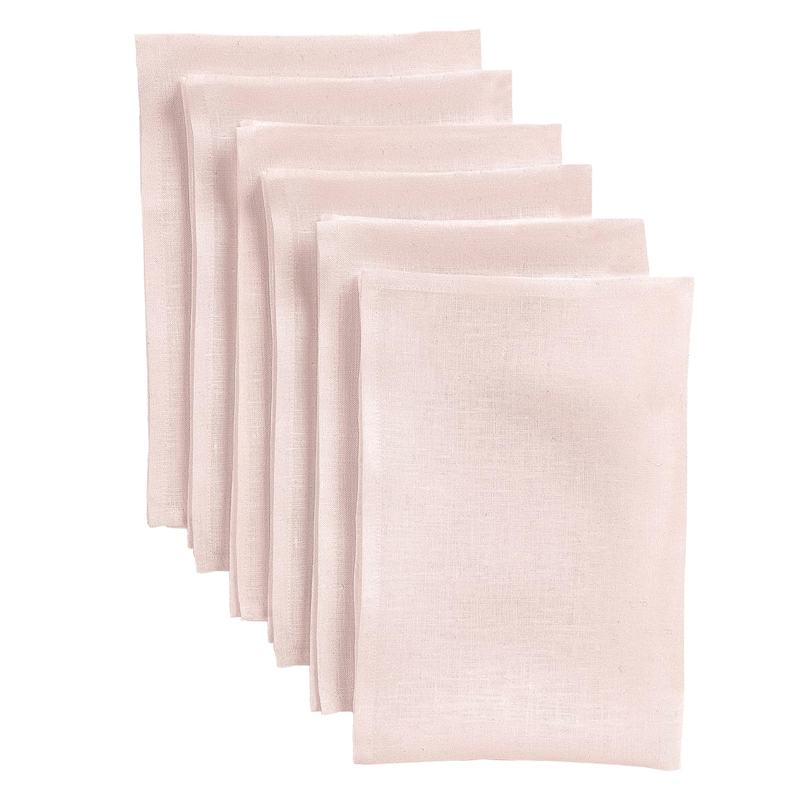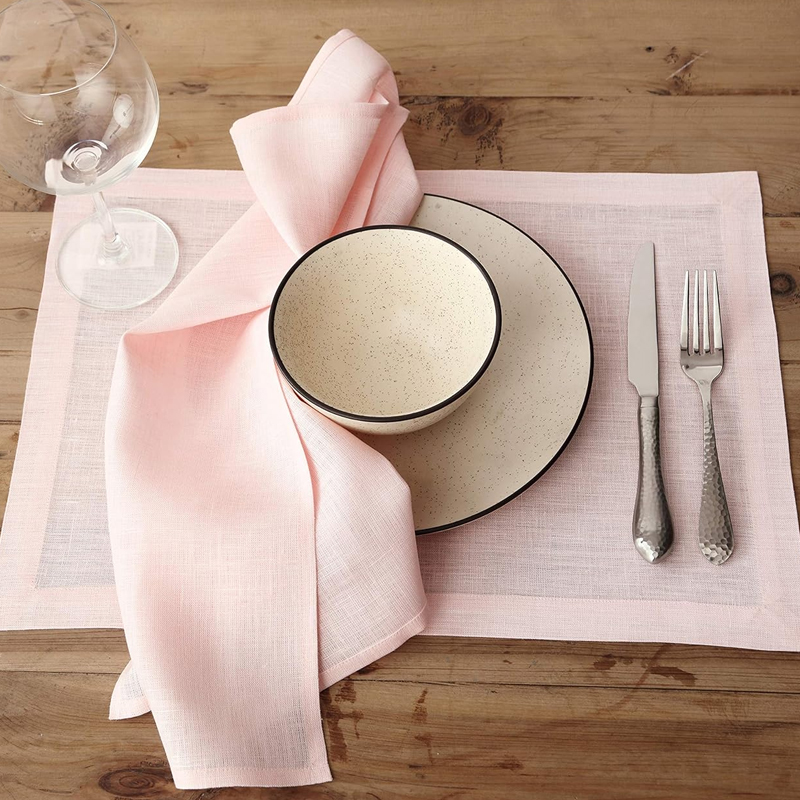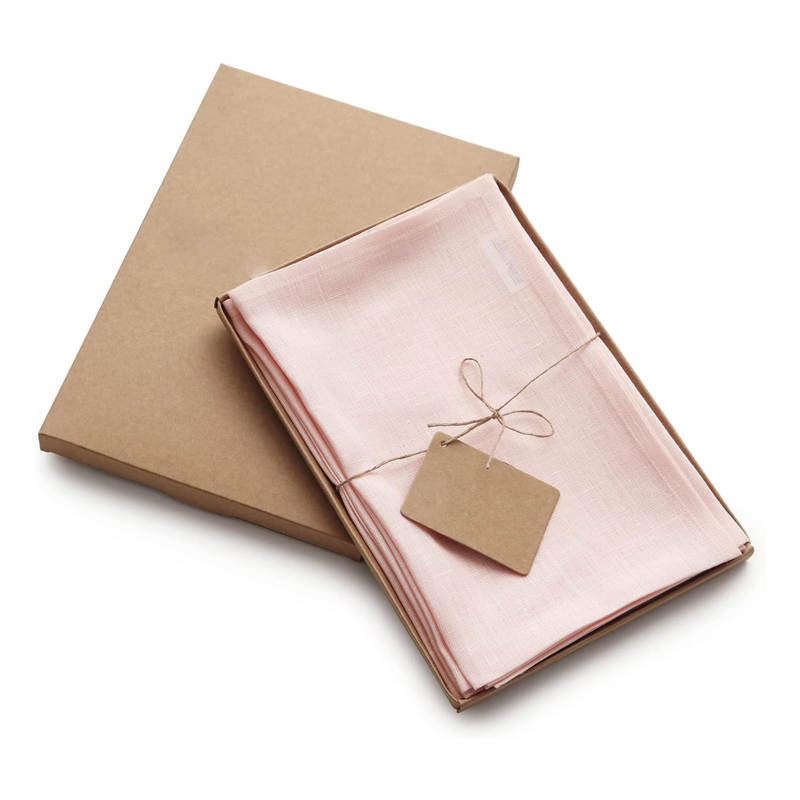Elegant Printed Cloth Napkins | Custom Styles & Wholesale
Sep . 15, 2025 07:40 Back to list
Elegant Printed Cloth Napkins | Custom Styles & Wholesale
Industry Trends in Premium Textile Disposables
The global hospitality and event management sectors are witnessing a significant paradigm shift towards sustainable yet aesthetically superior solutions. Within this evolving landscape, the demand for high-quality, reusable textile products, particularly the printed cloth napkin, is experiencing robust growth. Market analysis indicates a Compound Annual Growth Rate (CAGR) of approximately 5.5% for the reusable textile linens segment from 2023 to 2028, driven by heightened environmental consciousness, stringent regulatory pressures against single-use plastics, and a persistent desire for elevated guest experiences.
Modern trends emphasize personalization and brand integration, making custom-printed cloth napkin an indispensable asset for businesses ranging from luxury hotels and fine-dining restaurants to large-scale wedding venues and corporate event organizers. Key innovations include advancements in digital printing technologies, enabling higher resolution, intricate designs, and broader color gamuts on various fabric types. Furthermore, the push for eco-friendly materials, such as recycled polyester or organic cotton blends, is reshaping material sourcing and manufacturing processes, aligning with corporate sustainability goals and consumer preferences for responsible products. The market for wholesale cloth napkin solutions is particularly vibrant, catering to bulk orders for diverse applications, including special events and recurring commercial use.

Manufacturing Process Flow of Advanced Printed Cloth Napkin
The production of a high-quality printed cloth napkin involves a series of meticulously controlled stages, ensuring durability, aesthetic appeal, and adherence to international quality standards. This detailed process flow outlines the journey from raw material to finished product, emphasizing key technical specifications and quality checkpoints.
1. Material Sourcing and Preparation
- Material Selection: Fabrics such as 100% premium satin polyester, cotton, linen, or poly-cotton blends are chosen based on desired handfeel, drape, and durability. For instance, satin polyester offers a luxurious sheen and wrinkle resistance, ideal for wedding cloth napkins.
- Pre-treatment: Raw fabric undergoes mercerization (for cotton) to enhance strength and dye affinity, desizing to remove sizing agents, and scouring to eliminate impurities. This prepares the fabric for optimal printing and dyeing results.
2. Dyeing and Fabric Finishing
- Dyeing: Fabrics are dyed using reactive dyes for cotton and disperse dyes for polyester, ensuring high colorfastness. This process adheres to ISO 105 standards for colorfastness to washing and light.
- Finishing: Fabrics are treated for wrinkle resistance, soil release, and often fire retardancy (especially for commercial hospitality use). Calendering and heat-setting provide desired texture and dimensional stability.
3. Digital Printing (Customization)
For a printed cloth napkin, digital sublimation printing (for polyester) or direct-to-fabric inkjet printing (for natural fibers) is employed. This allows for intricate, high-resolution designs, logos, or patterns with excellent color vibrancy. The process eliminates the need for screens, reducing setup costs and enabling small batch customization. Inks used are typically OEKO-TEX certified, ensuring safety and environmental compliance.
4. Cutting and Hemming
- Precision Cutting: Automated laser or CAD-guided cutting machines ensure precise dimensions, minimizing fabric waste and ensuring uniformity across batches. Typical sizes for a cloth napkin range from 18x18 inches to 22x22 inches.
- Hemming: Edges are meticulously hemmed using industrial sewing machines, with options for standard folded hems, merrow stitching, or intricate rolled hems. This prevents fraying and contributes to the napkin's longevity and professional finish.
5. Quality Control and Packaging
- Inspection: Each printed cloth napkin undergoes rigorous inspection for print quality, color accuracy, seam integrity, and dimensional consistency, adhering to AQL (Acceptable Quality Limit) standards.
- Testing Standards: Products are tested for tensile strength (ASTM D5034), pilling resistance (ASTM D3511), and shrinkage (AATCC 135). ISO 9001 certified manufacturers ensure consistent quality management.
- Packaging: Napkins are carefully folded, ironed, and packaged to prevent creasing during transit, often using recycled or biodegradable packaging materials.
The service life of a premium cloth napkin can exceed 200 wash cycles, depending on fabric type and care, significantly outperforming disposable alternatives. Target industries include hospitality (hotels, restaurants), event management (weddings, corporate functions), and corporate branding. Advantages in typical application scenarios include enhanced brand image, energy saving through reduced waste generation, and superior corrosion resistance to common stains and detergents compared to untreated fabrics.
Schematic Step Representation:
- Fabric Roll → Pre-treatment (Desizing, Scouring, Mercerization)
- Dyeing (Color Standardization) → Finishing (Wrinkle/Soil Resistance)
- Digital Printing (Custom Design Application)
- Precision Cutting (Dimensional Accuracy)
- Hemming/Sewing (Edge Finishing)
- Quality Inspection (AQL, Standards Testing)
- Packaging → Shipment
Technical Specifications: Satin Multi-Color Plain Table Napkin
Understanding the core technical parameters of a printed cloth napkin is crucial for B2B buyers to ensure product suitability for specific operational demands. The following table details the specifications for a premium satin multi-color plain table napkin, representative of products suitable for events like wedding cloth napkins and high-end hospitality use.
| Parameter | Specification | Testing Standard / Notes |
|---|---|---|
| Product Name | Satin Multi Colors Plain Table Napkin Dinner Napkins for Wedding | Representative product type |
| Material Composition | 100% Polyester (Satin Weave) | High-luster, durable synthetic fiber |
| Fabric Weight (GSM) | Approximately 100-120 GSM | Optimal balance of drape and durability |
| Standard Dimensions | 20" x 20" (50cm x 50cm) | Custom sizes available upon request |
| Colorfastness to Washing | Grade 4-5 (on a 1-5 scale) | ISO 105-C06; minimal color degradation after repeated washes |
| Shrinkage Rate | Less than 2% after 5 washes | AATCC 135; maintains size and shape |
| Pilling Resistance | Grade 4 (on a 1-5 scale) | ASTM D3511; resists surface fiber entanglement |
| Wrinkle Resistance | Excellent | Minimizes need for ironing, professional appearance |
| Hemming Type | Merrowed Edge / Folded Hem (depending on design) | Durable and aesthetically pleasing finish |
| Certifications | OEKO-TEX Standard 100 (Fabric & Dyes) | Ensures absence of harmful substances |
These specifications highlight the commitment to quality and performance, ensuring that each printed cloth napkin meets the rigorous demands of commercial use while retaining its aesthetic appeal.

Versatile Application Scenarios
The adaptability of the printed cloth napkin makes it a staple across numerous industries requiring a blend of functionality and refined presentation. Its ability to convey brand identity and elevate dining experiences positions it as a superior choice over disposable alternatives.
- Hospitality Sector: Luxury hotels, resorts, and fine-dining restaurants leverage custom-printed cloth napkin to reinforce brand aesthetics and provide a memorable guest experience. Branded napkins often feature hotel logos or unique patterns that complement interior design.
- Event Management: For high-profile events, conferences, and particularly wedding cloth napkins, personalized designs are paramount. They can match event themes, display monograms, or showcase intricate artwork, adding a bespoke touch that leaves a lasting impression. Event organizers frequently procure these in wholesale quantities to manage large guest lists efficiently.
- Catering Services: Premium caterers utilize these napkins to enhance their service presentation, ensuring consistent quality and branding across diverse venues, from corporate galas to private celebrations.
- Corporate Branding and Promotional Items: Companies use custom-printed napkins for internal corporate events, product launches, or as high-end promotional merchandise, offering a tactile and reusable brand touchpoint.
- Cruise Lines and Airlines: Offering a sophisticated dining experience, premium carriers integrate custom cloth napkin to elevate inflight or onboard service, aligning with luxury travel branding.
In each scenario, the durability and premium feel of a textile napkin significantly contribute to perceived value and customer satisfaction, proving its versatility beyond mere utility.
Technical Advantages Over Alternatives
Choosing a printed cloth napkin presents distinct advantages over paper or lower-quality textile alternatives, particularly for B2B entities focused on long-term value, sustainability, and brand prestige. These benefits are rooted in advanced material science and manufacturing precision.
- Superior Durability & Longevity: Engineered from high-tensile strength polyester or robust cotton blends, premium napkins withstand hundreds of commercial laundering cycles without significant degradation in color, texture, or structural integrity. This translates to a lower total cost of ownership compared to continuous procurement of disposable options.
- Enhanced Aesthetic & Tactile Experience: The inherent drape, softness, and luxurious sheen of satin polyester, or the crisp feel of quality cotton, elevate the dining experience significantly. Custom printing capabilities allow for intricate, high-definition designs that paper napkins cannot replicate, creating a premium brand touchpoint.
- Sustainable & Eco-Friendly Profile: Reusable cloth napkin significantly reduce landfill waste associated with single-use products. Many manufacturers also offer options made from recycled content or organic fibers, further bolstering environmental credentials and aligning with ISO 14001 environmental management standards.
- Exceptional Stain Resistance: Advanced fabric finishes provide improved resistance to common food and beverage stains, ensuring easier cleaning and prolonged pristine appearance. This reduces the need for harsh chemicals during laundering, extending fabric life.
- Hygienic Superiority: When laundered to commercial standards (e.g., thermal disinfection), textile napkins offer a hygienic surface, meeting public health requirements. This contrasts with paper napkins which, while single-use, may not always be manufactured or handled under sterile conditions.
- Cost-Effectiveness in Bulk: For large-scale operations requiring wholesale quantities, the initial investment in reusable napkins is quickly offset by reduced ongoing procurement costs and waste management expenses.
These technical advantages underscore the value proposition of investing in high-grade cloth napkin for any discerning commercial establishment.
Vendor Comparison for Wholesale Cloth Napkin
Selecting the right supplier for printed cloth napkin involves evaluating several critical factors beyond mere price. This comparison focuses on key differentiators among leading B2B vendors specializing in textile linens.
| Criterion | Vendor A (Premium Specialist) | Vendor B (Cost-Effective Bulk) | Vendor C (Mid-Range Customizable) |
|---|---|---|---|
| Product Quality (Fabric GSM, Weave) | Excellent (120+ GSM, fine satin/damask) | Good (80-100 GSM, plain weave) | Very Good (100-110 GSM, twill/satin blend) |
| Customization Options (Printing) | Full digital printing, embroidery, Pantone matching | Limited screen printing, basic color options | Digital printing, common color matching, simple embroidery |
| Certifications | OEKO-TEX, ISO 9001, GOTS (for organic options) | Basic quality checks, no specific external certs | OEKO-TEX Standard 100 |
| Lead Time (Custom Orders) | 4-6 weeks (due to complex custom processes) | 2-3 weeks (for standard stock with simple prints) | 3-5 weeks |
| Pricing Model | Higher initial cost, significant bulk discounts | Lowest per-unit cost for high volume | Competitive, good value for quality |
| Customer Support | Dedicated account manager, rapid response | Standard email support, longer response times | Responsive, tiered support options |
This comparison illustrates that the choice of vendor should align with specific business priorities, whether it's uncompromised quality and extensive customization (Vendor A), maximal cost efficiency for standard products (Vendor B), or a balanced approach (Vendor C) for custom cloth napkin requirements.
Customized Solutions and Application Case Studies
The true power of the printed cloth napkin lies in its unparalleled customization potential, allowing businesses to transform a functional item into a powerful branding tool. We offer comprehensive customized solutions to meet diverse client needs, from fabric selection to intricate graphic reproduction.
Customization Capabilities:
- Fabric & Finish: Clients can specify fabric type (e.g., satin polyester, cotton, linen, blends), weave (e.g., plain, sateen, damask), and specialized finishes (e.g., permanent press, soil release, antimicrobial).
- Size & Shape: Beyond standard squares, custom dimensions and even specific shapes can be fabricated to match unique table settings or event requirements.
- Color & Pattern Matching: Utilizing advanced digital printing, precise Pantone color matching ensures brand consistency. Intricate patterns, photographic imagery, and complex graphic designs are accurately reproduced.
- Branding & Embellishment: Options include edge-to-edge full-color printing, subtle woven logos, high-quality embroidery, and even specialized edge treatments for an exclusive look.
Application Case Studies:
Case Study 1: "The Grandeur Hotel Chain"
Challenge: The Grandeur Hotel, a luxury chain with 15 properties globally, sought to standardize its high-end dining experience while subtly reinforcing its iconic logo. Their existing napkins were generic and lacked distinct branding.
Solution: We provided custom wholesale satin polyester cloth napkin, sized 22"x22", with the hotel's crest subtly woven into the fabric. The color palette was precisely matched to their corporate identity (Pantone 280 C) and treated with a soil-release finish for extended service life. The napkins also underwent OEKO-TEX certification to ensure guest safety.
Outcome: The branded napkins elevated the perceived value of their dining service, contributing to higher guest satisfaction scores (an average increase of 7% in dining experience ratings across properties) and strengthening brand recognition. The superior durability led to a 25% reduction in annual replacement costs compared to previous generic options.
Case Study 2: "Everlast Events Inc."
Challenge: Everlast Events, a premier event planner, required highly personalized wedding cloth napkins for their clients. Each wedding had a unique theme, demanding intricate designs and specific color combinations, often with short lead times.
Solution: We implemented a rapid-response digital printing service for customized poly-cotton blend napkins. This allowed Everlast Events to offer clients bespoke designs—ranging from floral patterns to personalized monograms and dates—with an average turnaround of 3 weeks for orders up to 500 units. The blend offered durability for reusability and excellent print clarity.
Outcome: Everlast Events significantly expanded its premium offerings, securing 15% more high-value wedding contracts in the subsequent year. Customer feedback consistently highlighted the unique and high-quality personalized napkins as a key factor in their event satisfaction, reinforcing Everlast's reputation for exceptional attention to detail.

Trustworthiness: FAQ, Lead Time, Warranty & Support
Building lasting B2B relationships requires transparency, clear commitments, and reliable support. Our approach to providing wholesale cloth napkin, including custom printed cloth napkin, is founded on these principles.
Frequently Asked Questions (FAQ)
- Q: What is the minimum order quantity (MOQ) for custom-printed napkins?
A: Our standard MOQ for custom printed cloth napkin begins at 250 units, but this can be flexible for intricate designs or specialized fabrics. Please contact our sales team for specific project requirements. - Q: What file formats are required for custom print designs?
A: We prefer vector-based files such as AI, EPS, or high-resolution PDF for optimal print quality. Raster images (JPEG, PNG) should be at least 300 DPI at actual print size. - Q: Are your napkins machine washable?
A: Yes, all our cloth napkin are designed for commercial-grade machine washing. Specific care instructions are provided with each order to maximize product longevity. - Q: Do you offer samples before a bulk order?
A: Yes, we offer physical samples of our standard fabrics and generic cloth napkin. Custom-printed samples may incur a small setup fee.
Lead Time & Fulfillment
Our standard lead time for wholesale orders of in-stock, plain cloth napkin is typically 1-2 weeks. For custom-printed cloth napkin or orders requiring specific fabric dyeing, the lead time ranges from 4-6 weeks, depending on complexity and order volume. Expedited production and shipping options are available upon request to accommodate urgent deadlines. All shipments are meticulously packed and tracked to ensure on-time and damage-free delivery.
Warranty Commitments
We stand behind the quality of our products. All our printed cloth napkin come with a 1-year limited warranty covering manufacturing defects, including issues with stitching, fabric integrity, and print durability under normal use and recommended care instructions. This warranty underscores our confidence in our production processes and material selection, adhering to ISO 9001 quality management principles.
Customer Support Information
Our dedicated B2B customer support team is available to assist with inquiries, order management, and after-sales service. We offer multi-channel support to ensure prompt and efficient communication:
- Email Support: sales@yourcompany.com (24-hour response guarantee)
- Phone Support: +1 (800) XXX-XXXX (Monday-Friday, 9 AM - 5 PM EST)
- Dedicated Account Managers: For large volume or recurring clients, a dedicated account manager ensures personalized service and streamlined communication.
We are committed to fostering long-term partnerships through exceptional product quality and unwavering customer service.
References
- ISO. (2022). ISO 9001: Quality management systems – Requirements. International Organization for Standardization.
- OEKO-TEX. (2023). OEKO-TEX Standard 100: Testing for harmful substances. OEKO-TEX Association.
- ASTM International. (2023). ASTM D5034-23: Standard Test Method for Breaking Strength and Elongation of Textile Fabrics (Grab Test). ASTM International.
- Market Research Future. (2023). Reusable Textile Linens Market: Global Forecast till 2030. Retrieved from MarketResearchFuture.com.
- AATCC. (2022). AATCC Test Method 135: Dimensional Changes of Fabrics after Home Laundering. American Association of Textile Chemists and Colorists.
-
Durable and Sustainable Sets of Bedsheets and Curtains | Global Textile Trends 2024
NewsNov.24,2025
-
Organic Curtains | Sustainable Window Treatments for Healthier Homes
NewsNov.23,2025
-
Elevate Hotel Comfort & Efficiency with Blackout Curtain Rode Hotel Solutions
NewsNov.22,2025
-
Explore White Design Luxury Window Curtains for Elegant and Sustainable Living
NewsNov.22,2025
-
Curtain Fabric for Hometextile: Sustainable Choices for Style & Function
NewsNov.21,2025
-
100% Organic Linen Baby Crib Set â Linen Home Textile|Hypoallergenic&Breathable
NewsNov.21,2025
